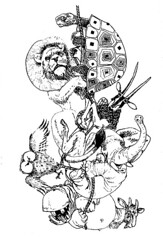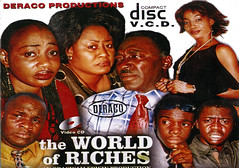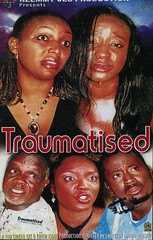A Seminal Lunacy
No one was responsible for the great Wall Street crash. No one engineered the speculation that preceded it. Both were the product of the free choice and decision of hundreds of thousands of individuals. The latter were not led to the slaughter. They were impelled to it by the seminal lunacy which has always seized people who are seized in turn with the notion that they can become very rich.I was reading Galbraith's tome last summer in an attempt to clear my thinking about bubbles and their typical aftermath. Later in his life Galbraith would cover financial euphoria more closely, but here it was all about its counterpart: the crash. He surely had a twinkle in his eye as he made his felicitous coinage of "seminal lunacy", lowering the reader's guard before proceeding to skewer at will. The book was a tonic for him to write and it is accordingly a tonic to read.
— The Great Crash 1929 by John Kenneth Galbraith
News headlines are replete with mantras about sound fundamentals, healthy economies that are resilient, innovations that are safe, disruptions that are contained and so forth. On this trend he had some cutting observations:
By affirming solemnly that prosperity will continue, it is believed that one can help insure that prosperity will in fact continue. Especially among businessmen the faith in the efficiency of such incantation is very great.Stated another way, this is merely a tactic for dealing with ignorance.
That much of what was repeated about the market - then as now - bore no relation to reality is important, but not remarkable. Between human beings there is a type of intercourse which proceeds not from knowledge, or even from lack of knowledge, but from failure to know what isn't known. This was true of much of the discourse on the market.It is often effective.
We are a polite and cautious people, and we avoid unpleasantness.Social beasts that we are, we follow the herd.
Others pointed out that the prospects for business were good and that the stock market debacle would not make them any less favorable. No one knew, but it cannot be stressed too frequently, that for effective incantation knowledge is neither necessary nor assumed.There is perhaps an echo of Walter Bagehot's observation in Lombard Street
Every great crisis reveals the excessive speculations of many houses which no one before suspected.
We have the spectre of bemused and gray suited serious technocrats making pronoucements with great alacrity. And a wary public begins to ask whither regulation. But that is by the by
One of the oldest puzzles in politics is who is to regulate the regulators. But an equally baffling problem, which has never received the attention it deserves, is who is to make wise those who are required to have wisdom.The great crash, like other seminal lunacies, caused much revision of the conventional wisdom.
What six months before had been a brilliant financial maneuver was now a form of fiscal self-immolation. In the last analysis, the purchase by a firm of its own stock is the exact opposite of the sale of stocks. It is by the sale of stock that firms ordinarily grow.There are likely many contemporary equivalents to the deficiencies pointed out about buying your own stock. Modern finance has been shown to favour opacity over transparency and the consequent costs are mounting.
Looking forward we can expect lots of hearings, meetings and busy work. Politicians shown to have been asleep at the wheel will now demand answers.
The rite of the meeting which is called not to do business but to do no business... one of the oldest, most important - and unhappily, one of the least understood - rites in American life.Action is the theme of the day
Men meet together for many reasons in the course of business. They need to instruct or persuade each other. They must agree on a course of action. They find thinking in public more productive or less painful than thinking in private. But there are at least as many reasons for meetings to transact no business. Meetings are held because men seek companionship or, at a minimum, wish to escape the tedium of solitary duties. They yearn for prestige which accrues to the man who presides over meetings, and this leads them to convoke assemblages over which they can preside. Finally there is the meeting which is called not because there is business to be done, but because it is necessary to create the impression that business is being done. Such meetings are more than a substitute for action. They are widely regarded as action.When histories are written about our present disillusionment they will surely read like Galbraith's summary of the reasons behind the crash:
In 1929 the economy was fundamentally unsound...By harkening to "fundamentally unsound" and ending with a note about "economic intelligence", Galbraith puts the knife in Herbert Hoover and others of his ilk.
- the bad distribution of income... highly unequal income distribution meant that the economy was dependent on a high level of investment or a high level of luxury consumer spending or both...
- the bad corporate structure... the vast new structure of holding companies and investment trusts...
- the bad banking structure...
- the dubious state of the foreign balance...
- the poor state of economic intelligence
It requires neither courage nor prescience to predict disaster. Courage is required of the man who, when things are good, says so. Historians rejoice in crucifying the false prophet of the millenium. The never dwell on the mistake of the man who wrongly predicted Armageddon.There are lots of emotions when it comes to finance, concern chief among them. During a crash or panic, emotions turn darker and this can be a perilous time.
Despite a flattering supposition to the contrary, people come readily to terms with power. There is little reason to think that the power of the great bankers, while they were assumed to have it, was much resented. But as the ghosts of numerous tyrants, from Julius Caesar to Benito Mussolini will testify, people are very hard on those who, having had power, lose it or are destroyed. Then anger at past arrogance is joined with contempt for present weakness. The victim or his corpse is made to suffer all available indignities.And a parting warning for those erstwhile masters:
One trouble with being wrong is that it robs the prophet of his audience when he most needs it to explain why.Shell games do have costs.
A brief soundtrack
- Ralph Tresvant - It's Goin' Down
- Public Enemy - Shut 'Em Down (Pete Rock Mix)
The best remix ever. Period. - Abbey Lincoln - Down Here Below
Abbey sings it best: "the winds of change are blowing through the weary night".
File under: economics, zingers, quotes, observation, culture, bubble, panic, depression, crash, credit, finance, Galbraith, USA, literature, toli




1 comment:
The Nollywood covers are perfect, just waiting for this moment.
Post a Comment